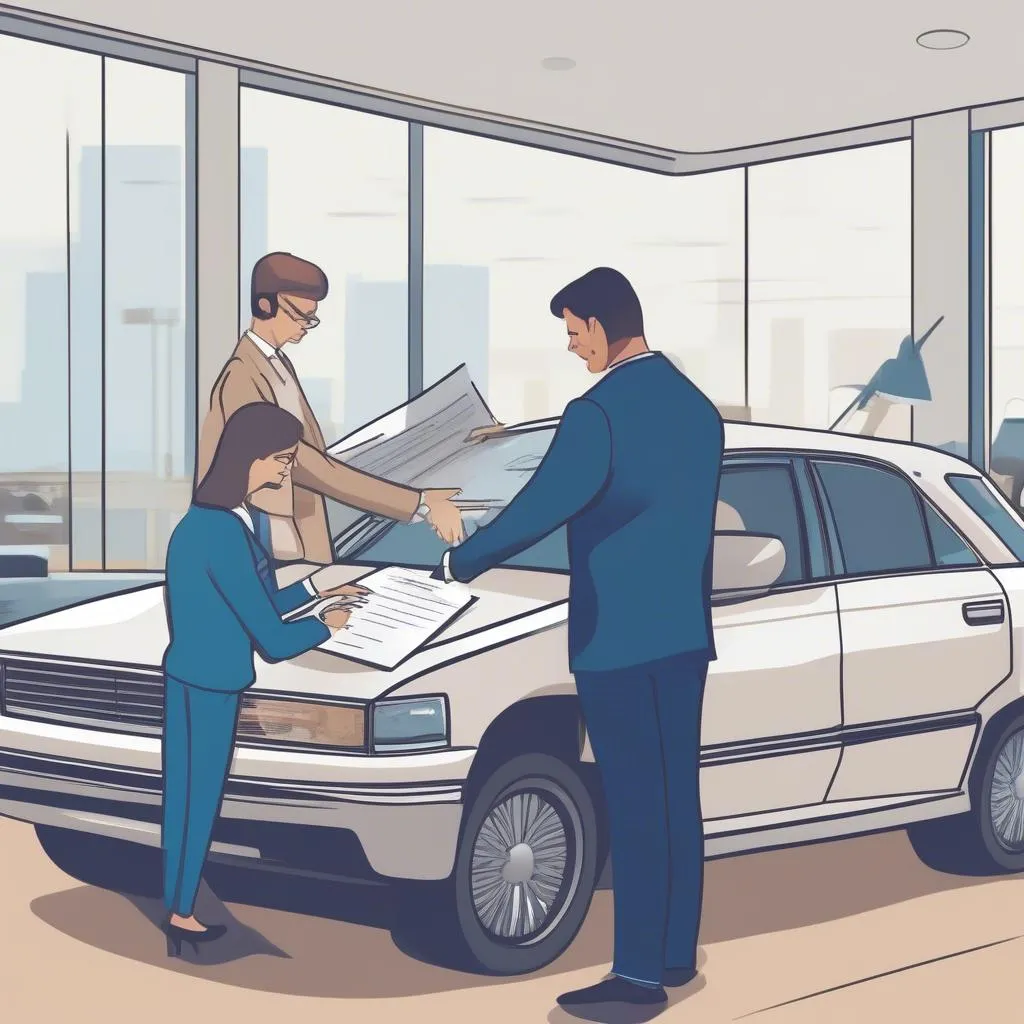Have you ever wondered how much your used car is worth? Maybe you’re considering selling it, or perhaps you just want to know its market value. Whatever the reason, understanding your car’s “blue book value” is essential.
What is Auto Blue Book Value?
The term “Auto Blue Book Value” refers to the estimated market value of a used car. This value is based on various factors, including the car’s make, model, year, mileage, condition, and location.
Understanding Blue Book Value: A Mechanic’s Perspective
From a mechanic’s perspective, the blue book value reflects the car’s overall health and functionality. A car with a clean history, regular maintenance, and no major mechanical issues will generally command a higher blue book value. Think of it like a “report card” for the car – a good report card means a better price.
Blue Book Value: A Look at Market Trends
Blue book value is dynamic and can be influenced by broader market trends. For example, if the demand for a particular car model is high, its blue book value might increase. Conversely, if the model is in less demand, the value might decrease.
How to Find the Auto Blue Book Value of Your Used Car
There are several resources available to help you determine your car’s blue book value. Here are a few popular options:
1. Online Valuation Tools:
- Kelley Blue Book (KBB): KBB is one of the most well-known and widely trusted sources for used car values. Their website provides a comprehensive valuation tool that considers various factors.
- Edmunds: Edmunds offers another reputable online valuation tool. Similar to KBB, Edmunds provides a detailed breakdown of the factors influencing your car’s worth.
2. Local Dealerships:
- Dealerships: Local dealerships often have their own valuation tools or can provide you with an estimate based on their current market knowledge. Remember, they are primarily focused on buying cars, so their estimates might be lower than what you might find online.
3. Private Sellers and Auction Sites:
- Craigslist and Facebook Marketplace: You can check listings for similar cars in your area to get an idea of what people are asking for. This can give you a general sense of the market value. However, keep in mind that prices on these platforms might be more variable than what you’d find on dedicated valuation websites.
Factors That Impact Blue Book Value
Several factors contribute to the blue book value of a used car. Here are a few key ones:
1. Make and Model:
- Popular Models: Cars with a high demand (e.g., Toyota Camry, Honda Accord) tend to hold their value better than niche models.
- Luxury Brands: Luxury brands (e.g., Mercedes-Benz, BMW) often have a higher blue book value compared to non-luxury brands, due to their reputation and craftsmanship.
2. Year and Mileage:
- Newer Cars: Newer cars generally have a higher blue book value than older cars, assuming they are in good condition.
- Lower Mileage: Cars with lower mileage tend to command a premium price.
3. Condition:
- Excellent Condition: Cars with a clean history, no significant damage, and regular maintenance will fetch a better price.
- Major Repairs: Cars that require extensive repairs or have significant damage will have a lower blue book value.
4. Location:
- Demand in Your Area: The demand for certain car models can vary geographically. For example, a popular SUV in a city with limited public transportation might have a higher blue book value than in a suburban area with good public transportation.
5. Additional Features:
- Options and Upgrades: Cars with desirable features, such as leather seats, a sunroof, or advanced safety systems, can increase their blue book value.
- Aftermarket Modifications: While some modifications can enhance a car’s value, others might actually decrease it. Consult with a qualified mechanic or a local dealer for advice on how aftermarket modifications might affect your car’s value.
Understanding Blue Book Value: A Real-World Example
Imagine you’re selling a 2015 Honda Civic with 60,000 miles. You live in Denver, Colorado, and you’re looking for the best price. Using online tools like KBB or Edmunds, you can input your car’s information and receive a range of estimated values based on the factors we discussed. This range helps you determine a realistic asking price for your Civic.
 Blue book value 2015 Honda Civic Denver
Blue book value 2015 Honda Civic Denver
Frequently Asked Questions (FAQs)
Q: Is the blue book value the same as the actual selling price?
A: No, the blue book value is just an estimate. The actual selling price can vary depending on factors like negotiation, market conditions, and the buyer’s willingness to pay.
Q: Should I use the blue book value as my asking price?
A: It’s a good starting point, but you can adjust your asking price based on your car’s condition, your desired selling price, and the current market demand.
Q: What if my car has a lot of upgrades?
A: You can use the blue book value as a base and add a premium for any significant upgrades. However, it’s always best to consult with a local dealer or a qualified mechanic to determine a fair price.
Tips for Maximizing Your Car’s Value
1. Keep Your Car in Top Shape:
- Regular Maintenance: Regular oil changes, tire rotations, and inspections will help maintain your car’s condition and increase its resale value.
- Minor Repairs: Address any minor issues promptly to prevent them from escalating into major problems.
- Clean and Detail Your Car: A clean and well-detailed car will make a better impression on potential buyers.
2. Gather Documentation:
- Service Records: Keep all service records readily available to demonstrate your car’s maintenance history.
- Title and Registration: Ensure all documentation is up-to-date and in order.
3. Set a Realistic Asking Price:
- Research Market Value: Use online tools and local dealerships to determine a fair price based on the factors we discussed.
- Be Flexible: Be open to negotiation, but don’t sell your car for less than its fair market value.
Conclusion
Understanding your car’s blue book value is essential for anyone considering selling or trading their vehicle. By researching market values, considering your car’s condition, and being prepared to negotiate, you can maximize your chances of getting the best price.
Remember, we at Diag XCar are always here to help! If you have any questions or need help with car diagnostics, contact us via WhatsApp: +84767531508. Our team of experts is available 24/7 to provide you with the best possible support.
Feel free to leave a comment below if you have any other questions about the blue book value of used cars. We’d love to hear from you! You can also explore our website to learn more about car diagnostics, troubleshooting, and other helpful tips related to the automotive industry.
 Used Car Diagnostics
Used Car Diagnostics
 Used Car Buying
Used Car Buying


